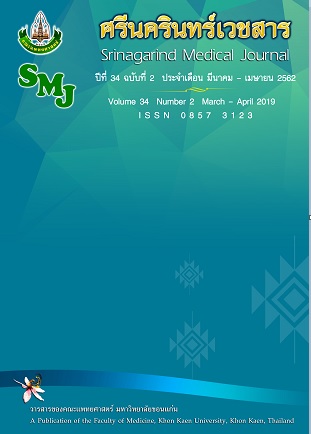Factors Associated with Medication Adherence in Schizophrenic Patients at Dong Luang Hospital
Keywords:
จิตเภท; ความร่วมมือในการใช้ยา; ปัจจัย; การเยี่ยมบ้าน, schizophrenic patients; medication adherence; factorAbstract
Background and Objective: Good compliance of oral antipsychotic medication is crucial in the treatment and symptom control of schizophrenic patients. This study aimed to evaluate medication adherence and factors influencing medication adherence in schizophrenic patients.
Methods: This was a cross-sectional descriptive study performed in 100 schizophrenic patients attended at the outpatient clinic, Dong Luang Hospital during 1 July and 31 December 2017. Research instruments included 1) Morisky medication adherence scale (MMAS 8–Items) 2) pill counting form 3) data collection form and 4) semi-structure interview form and questionnaire for factors affecting medication adherence. The data were analyzed by descriptive statistics and binary logistic regression.
Results: The results showed that 62 participants (62%) reported high levels of medication adherence by MMAS 8–Item and the pill count. Logistic regression analysis revealed 2 factors associated with medication adherence which were self-insight and attitudes toward medication. The coefficient of determination was 22%.
Conclusion: Most schizophrenic patients at Dong Luang Hospital (62%) had a good medication adherence. Self-insight and Attitudes toward medication were the factors associated with medication adherence.
References
2. Cramer J, Rosenheck R. Compliance with medication regimens for mental and physical disorders. Psychiatr Serv 1998; 49: 196-200.
3. Chunseng S. Factors Relating to Medication Adherence in Schizophrenia at Uttaradit Hospital. Master of Nursing Science (Mental Health and Psychiatric Nursing), Khon Kaen University; 2005.
4. Limpattanasiri J. Factors affecting medication adherence among schizophrenic patients. Master of Nursing Science (Psychiatric-Mental Health Nursing), Mahidol University; 2004.
5. Ninchaikowit T, Kanjanatanalert N. Positive and negative syndrome scale. 2 nd ed. Bangkok : [n.p.]; 2007.
6. Kongsakon R, Jareonsettasin T. Reliability and Validity of a New Measure of Patient Satisfaction. J Psychiatr Assoc Thailand 2013; 45: 155-63.
7. Tsang H, Fung K, Corrigan P. Psychosocial and socio-demographic correlates of medication compliance among people with schizophrenia. J Behav Ther and Exp Psychiatry 2009; 40: 3-14.
8. Farmer K. Methods for measuring and monitoring medication regimen adherence in clinical trials and clinical practice. Clin Ther 1999; 21: 1074-87.
9. Puengdokmai P, Charoenkitkarn V, Pinyopasahul W, Sriprasong S, Dumavibhat C. Factor influencing medication adherence in hypertensive patients without complication. Princess of Naradhiwas University Journal. 2016; 8: 16-26.
10. Garavan J, Browne S, Gervin M, Lane A, Lakin C. Compliance with neuroleptic medication in outpatients with schizophrenia;relationship to subjective response to neuroleptics;attitudes to medication and insight. Compr Psychiatry 1998; 39: 215-9.
11. Remington G, Kwon J, Collins A, Laporte D, Mann S, Christensen B. The use of electronic monitoring to evaluate antipsychotic compliance in outpatients with schizophrenia. Schizophr Res 2007; 90: 229-37.
12. Donohoe O, Owens N, Donnell OC, Burke T, Moore L, Tobin A, et al. Predictors of compliance with neuroleptic medication among inpatients with schizophrenia: a discriminant function analysis. Eur Psychiatry 2001; 16: 293-8.




